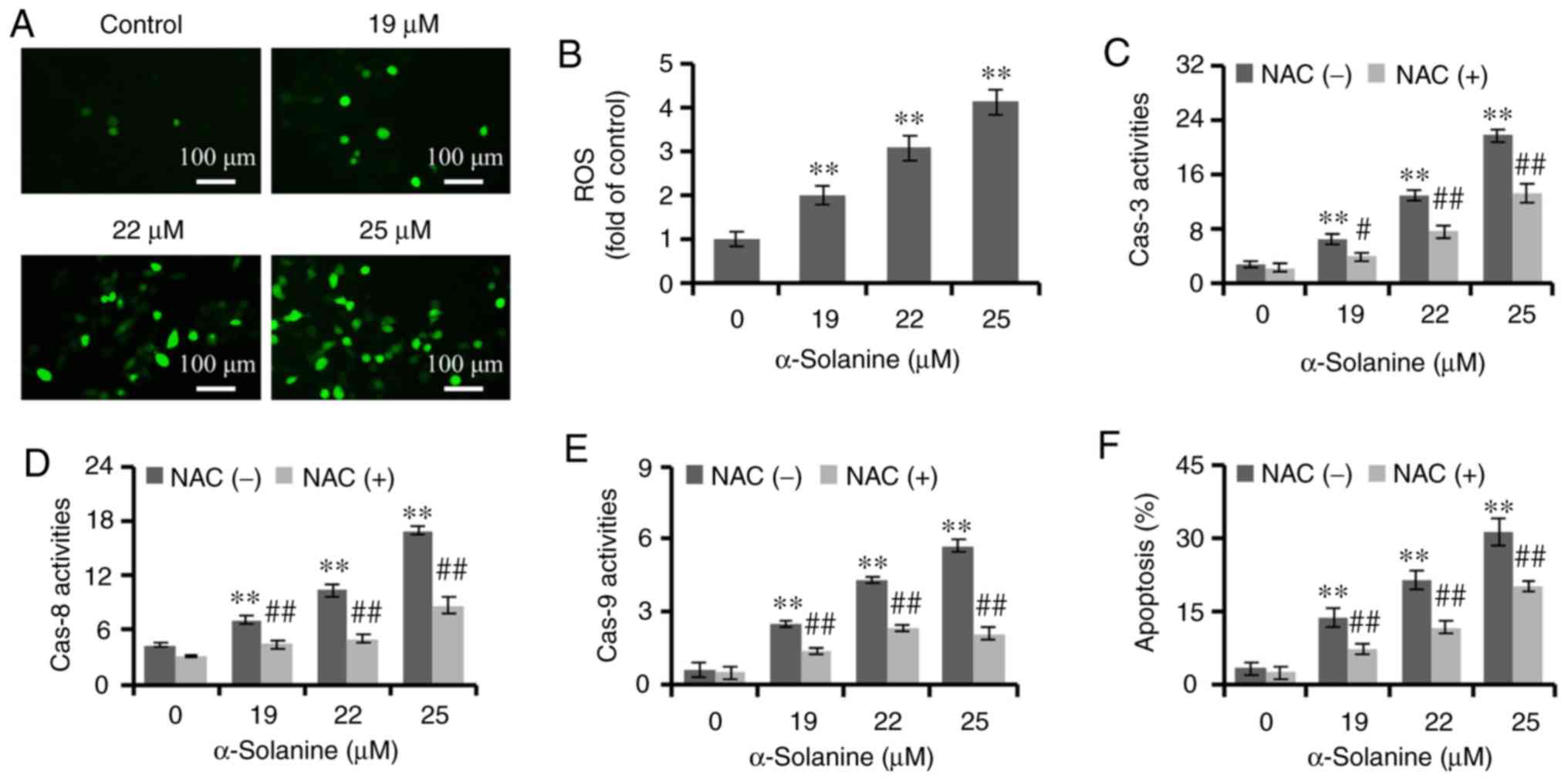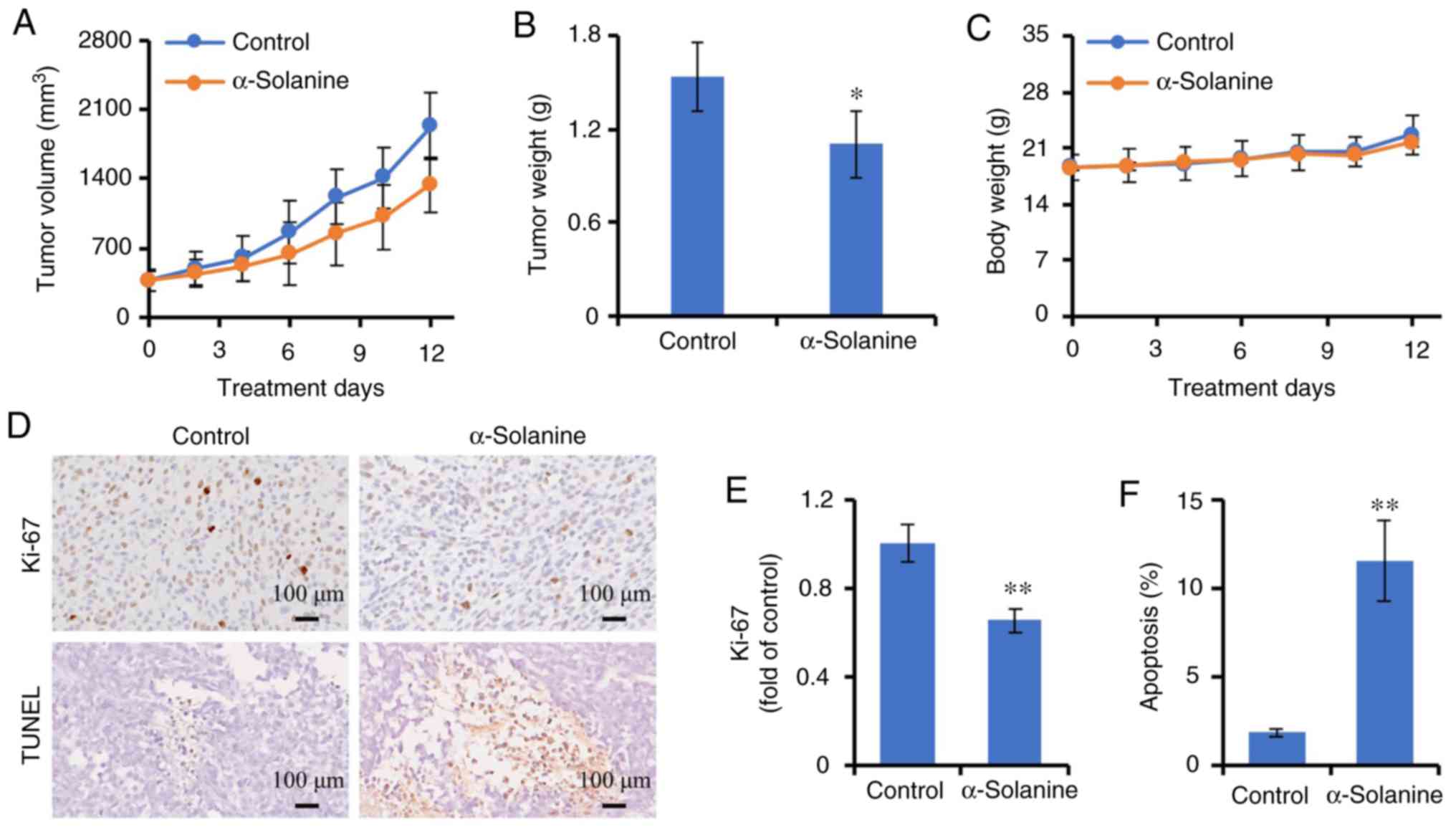|
1
|
Bray F, Ferlay J, Soerjomataram I, Siegel
RL, Torre LA and Jemal A: Global cancer statistics 2018: GLOBOCAN
estimates of incidence and mortality worldwide for 36 cancers in
185 countries. CA Cancer J Clin. 68:394–424. 2018. View Article : Google Scholar : PubMed/NCBI
|
|
2
|
Ahmed S, Johnson K, Ahmed O and Iqbal N:
Advances in the management of colorectal cancer: From biology to
treatment. Int J Colorectal Dis. 29:1031–1042. 2014. View Article : Google Scholar : PubMed/NCBI
|
|
3
|
Rentsch M, Schiergens T, Khandoga A and
Werner J: Surgery for colorectal cancer-trends, developments, and
future perspectives. Visc Med. 32:184–191. 2016. View Article : Google Scholar : PubMed/NCBI
|
|
4
|
McQuade RM, Stojanovska V, Bornstein JC
and Nurgali K: Colorectal cancer chemotherapy: The evolution of
treatment and new approaches. Curr Med Chem. 24:1537–1557. 2017.
View Article : Google Scholar : PubMed/NCBI
|
|
5
|
De Mello RA, Marques AM and Araújo A:
Epidermal growth factor receptor and metastatic colorectal cancer:
Insights into target therapies. World J Gastroenterol.
19:6315–6318. 2013. View Article : Google Scholar : PubMed/NCBI
|
|
6
|
Battaglin F, Puccini A, Intini R,
Schirripa M, Ferro A, Bergamo F, Lonardi S, Zagonel V, Lenz HJ and
Loupakis F: The role of tumor angiogenesis as a therapeutic target
in colorectal cancer. Expert Rev Anticancer Ther. 18:251–266. 2018.
View Article : Google Scholar : PubMed/NCBI
|
|
7
|
Passardi A, Canale M, Valgiusti M and
Ulivi P: Immune checkpoints as a target for colorectal cancer
treatment. Int J Mol Sci. 18(pii): E13242017. View Article : Google Scholar : PubMed/NCBI
|
|
8
|
Zhong LL, Chen HY, Cho WC, Meng XM and
Tong Y: The efficacy of Chinese herbal medicine as an adjunctive
therapy for colorectal cancer: A systematic review and
meta-analysis. Complement Ther Med. 20:240–252. 2012. View Article : Google Scholar : PubMed/NCBI
|
|
9
|
Deng S, Hu B and An HM: Traditional
Chinese medicinal syndromes and treatment in colorectal cancer. J
Cancer Ther. 3:888–897. 2012. View Article : Google Scholar
|
|
10
|
Jain R, Sharma A, Gupta S, Sarethy IP and
Gabrani R: Solanum nigrum: Current perspectives on
therapeutic properties. Altern Med Rev. 16:78–85. 2011.PubMed/NCBI
|
|
11
|
Hu B, An HM, Shen KP, Shi XF, Deng S and
Wei MM: Effect of Solanum nigrum on human colon carcinoma
RKO cells. Zhong Yao Cai. 36:958–961. 2013.(In Chinese). PubMed/NCBI
|
|
12
|
Tai CJ, Wang CK, Tai CJ, Lin YF, Lin CS,
Jian JY, Chang YJ and Chang CC: Aqueous extract of Solanum
nigrum leaves induces autophagy and enhances cytotoxicity of
cisplatin, doxorubicin, docetaxel, and 5-fluorouracil in human
colorectal carcinoma cells. Evid Based Complement Alternat Med.
2013:5147192013. View Article : Google Scholar : PubMed/NCBI
|
|
13
|
Mohsenikia M, Alizadeh AM, Khodayari S,
Khodayari H, Kouhpayeh SA, Karimi A, Zamani M, Azizian S and
Mohagheghi MA: The protective and therapeutic effects of
alpha-solanine on mice breast cancer. Eur J Pharmacol. 718:1–9.
2013. View Article : Google Scholar : PubMed/NCBI
|
|
14
|
Lv C, Kong H, Dong G, Liu L, Tong K, Sun
H, Chen B, Zhang C and Zhou M: Antitumor efficacy of α-solanine
against pancreatic cancer in vitro and in vivo. PLoS One.
9:e878682014. View Article : Google Scholar : PubMed/NCBI
|
|
15
|
Shen KH, Liao AC, Hung JH, Lee WJ, Hu KC,
Lin PT, Liao RF and Chen PS: α-Solanine inhibits invasion of human
prostate cancer cell by suppressing epithelial-mesenchymal
transition and MMPs expression. Molecules. 19:11896–11914. 2014.
View Article : Google Scholar : PubMed/NCBI
|
|
16
|
Meng XQ, Zhang W, Zhang F, Yin SY, Xie HY,
Zhou L and Zheng SS: Solanine-induced reactive oxygen species
inhibit the growth of human hepatocellular carcinoma HepG2 cells.
Oncol Lett. 11:2145–2151. 2016. View Article : Google Scholar : PubMed/NCBI
|
|
17
|
Yarrow JC, Perlman ZE, Westwood NJ and
Mitchison TJ: A high-throughput cell migration assay using scratch
wound healing, a comparison of image-based readout methods. BMC
Biotechnol. 4:212004. View Article : Google Scholar : PubMed/NCBI
|
|
18
|
Liang CC, Park AY and Guan JL: In vitro
scratch assay: A convenient and inexpensive method for analysis of
cell migration in vitro. Nat Protoc. 2:329–333. 2007. View Article : Google Scholar : PubMed/NCBI
|
|
19
|
Hu B, An HM, Yan X, Zheng JL, Huang XW and
Li M: Traditional Chinese medicine formulation Yanggan Jiedu Sanjie
inhibits TGF-β1-induced epithelial-mesenchymal transition and
metastatic potential in human hepatocarcinoma Bel-7402 cells. BMC
Complement Altern Med. 19:672019. View Article : Google Scholar : PubMed/NCBI
|
|
20
|
Hu B, An HM, Wang SS, Zheng JL, Yan X,
Huang XW and Tian JH: Teng-Long-Bu-Zhong-Tang induces p21-dependent
cell senescence in colorectal carcinoma LS174T cells via histone
acetylation. J Exp Pharmacol. 9:67–72. 2017. View Article : Google Scholar : PubMed/NCBI
|
|
21
|
Kaczanowski S: Apoptosis: Its origin,
history, maintenance and the medical implications for cancer and
aging. Phys Biol. 13:0310012016. View Article : Google Scholar : PubMed/NCBI
|
|
22
|
Redza-Dutordoir M and Averill-Bates DA:
Activation of apoptosis signalling pathways by reactive oxygen
species. Biochim Biophys Acta. 1863:2977–2992. 2016. View Article : Google Scholar : PubMed/NCBI
|
|
23
|
Asghar U, Witkiewicz AK, Turner NC and
Knudsen ES: The history and future of targeting cyclin-dependent
kinases in cancer therapy. Nat Rev Drug Discov. 14:130–146. 2015.
View Article : Google Scholar : PubMed/NCBI
|
|
24
|
Chen MJ, Cheng AC, Lee MF and Hsu YC:
Simvastatin induces G1 arrest by up-regulating GSK3β and
down-regulating CDK4/cyclin D1 and CDK2/cyclin E1 in human primary
colorectal cancer cells. J Cell Physiol. 233:4618–4625. 2018.
View Article : Google Scholar : PubMed/NCBI
|
|
25
|
Goldar S, Khaniani MS, Derakhshan SM and
Baradaran B: Molecular mechanisms of apoptosis and roles in cancer
development and treatment. Asian Pac J Cancer Prev. 16:2129–2144.
2015. View Article : Google Scholar : PubMed/NCBI
|
|
26
|
Zou Z, Chang H, Li H and Wang S: Induction
of reactive oxygen species: An emerging approach for cancer
therapy. Apoptosis. 22:1321–1335. 2017. View Article : Google Scholar : PubMed/NCBI
|
|
27
|
Oh HN, Seo JH, Lee MH, Yoon G, Cho SS, Liu
K, Choi H, Oh KB, Cho YS, Kim H, et al: Oridonin induces apoptosis
in oral squamous cell carcinoma probably through the generation of
reactive oxygen species and the p38/JNK MAPK pathway. Int J Oncol.
Mar 16–2018.(Epub ahead of print). View Article : Google Scholar :
|
|
28
|
Li S, Cheng B, Hou L, Huang L, Cui Y, Xu
D, Shen X and Li S: Dioscin inhibits colon cancer cells' growth by
reactive oxygen species-mediated mitochondrial dysfunction and p38
and JNK pathways. Anticancer Drugs. 29:234–242. 2018. View Article : Google Scholar : PubMed/NCBI
|
|
29
|
Wu Q, Deng J, Fan D, Duan Z, Zhu C, Fu R
and Wang S: Ginsenoside Rh4 induces apoptosis and autophagic cell
death through activation of the ROS/JNK/p53 pathway in colorectal
cancer cells. Biochem Pharmacol. 148:64–74. 2018. View Article : Google Scholar : PubMed/NCBI
|
|
30
|
Wu D, Zhou WY, Lin XT, Fang L and Xie CM:
Bufalin induces apoptosis via mitochondrial ROS-mediated caspase-3
activation in HCT-116 and SW620 human colon cancer cells. Drug Chem
Toxicol. 42:444–450. 2019. View Article : Google Scholar : PubMed/NCBI
|
|
31
|
Valastyan S and Weinberg RA: Tumor
metastasis: Molecular insights and evolving paradigms. Cell.
147:275–292. 2011. View Article : Google Scholar : PubMed/NCBI
|
|
32
|
Guan X: Cancer metastases: Challenges and
opportunities. Acta Pharm Sin B. 5:402–418. 2015. View Article : Google Scholar : PubMed/NCBI
|
|
33
|
Dong W, Li H, Zhang Y, Yang H, Guo M, Li L
and Liu T: Matrix metalloproteinase 2 promotes cell growth and
invasion in colorectal cancer. Acta Biochim Biophys Sin (Shanghai).
43:840–848. 2011. View Article : Google Scholar : PubMed/NCBI
|
|
34
|
Shi M, Yu B, Gao H, Mu J and Ji C: Matrix
metalloproteinase 2 overexpression and prognosis in colorectal
cancer: A meta-analysis. Mol Biol Rep. 40:617–623. 2013. View Article : Google Scholar : PubMed/NCBI
|
|
35
|
Mook OR, Frederiks WM and Van Noorden CJ:
The role of gelatinases in colorectal cancer progression and
metastasis. Biochim Biophys Acta. 1705:69–89. 2004.PubMed/NCBI
|
|
36
|
Yang B, Tang F, Zhang B, Zhao Y, Feng J
and Rao Z: Matrix metalloproteinase-9 overexpression is closely
related to poor prognosis in patients with colon cancer. World J
Surg Oncol. 12:242014. View Article : Google Scholar : PubMed/NCBI
|
|
37
|
Oba K, Konno H, Tanaka T, Baba M, Kamiya
K, Ohta M, Kaneko T, Shouji T, Igarashi A and Nakamura S:
Prevention of liver metastasis of human colon cancer by selective
matrix metalloproteinase inhibitor MMI-166. Cancer Lett. 175:45–51.
2002. View Article : Google Scholar : PubMed/NCBI
|
|
38
|
Kang JH, Han IH, Sung MK, Yoo H, Kim YG,
Kim JS, Kawada T and Yu R: Soybean saponin inhibits tumor cell
metastasis by modulating expressions of MMP-2, MMP-9 and TIMP-2.
Cancer Lett. 261:84–92. 2008. View Article : Google Scholar : PubMed/NCBI
|






















